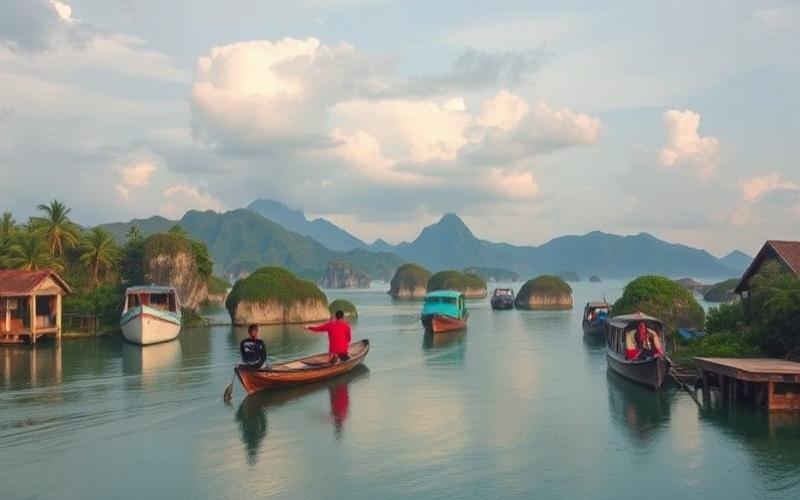
 Published on and written by Cyril Jarnias
Published on and written by Cyril Jarnias
Studying in Indonesia offers a unique opportunity to experience a rich and diverse cultural immersion in the heart of Southeast Asia. With its captivating blend of ancient traditions and emerging modernity, this vast and vibrant country is attracting an increasing number of international students.
Not only does Indonesia provide an education quality recognized by many global universities, but it is also a crossroads where a multitude of dialects, cultures, and breathtaking landscapes converge.
Between the hustle and bustle of Jakarta, the paradise beaches of Bali, and the serene countryside of Java, students have the chance to learn in an inspiring setting while actively participating in a dynamic and welcoming student community.
Pursuing Higher Education in Indonesia: Options for Expatriates
Indonesian universities welcoming expatriates include the University of Indonesia (UI) in Jakarta, the Bandung Institute of Technology (ITB), Gadjah Mada University (UGM) in Yogyakarta, Airlangga University (UNAIR) in Surabaya, as well as several institutions in Bali like Udayana University, Warmadewa University, and Undiknas University. These institutions offer cutting-edge programs in medicine, engineering, social sciences, management, and technology, with growing international openness.
Main Popular Programs Among Expatriates:
- University exchange programs (semester or year abroad)
- Programs fully or partially in English, particularly in management, engineering, computer science, tourism, and environmental sciences
- Dual degree programs in partnership with foreign universities
- Specialized short-term training (hospitality, arts, yoga, etc.)
Administrative Procedures for Expatriates:
- Letter of acceptance from the Indonesian university required
- Language test (English or Indonesian depending on the program)
- Detailed academic records (transcripts, diplomas)
- Proof of financial resources for the duration of stay
- Obtaining a student visa (KITAS), to be applied for on-site with an initial social/cultural visa
- Medical certificate sometimes required
Available Scholarships and Financial Aid:
| Scholarship Name | Target Audience | Programs Covered | Main Terms |
|---|---|---|---|
| KNB Scholarship | International Students | Bachelor’s, Master’s, PhD | Partial or full tuition coverage, monthly stipend |
| University Scholarships | Foreign Students | Varies by university | Tuition reduction, housing assistance, sometimes living expenses |
| Exchange Programs | Partner Students | Semester/Year | Partial tuition support |
Expatriate Community and Integration Services:
- Active international student groups on campuses
- Cultural and linguistic associations
- Orientation services, free Indonesian language classes, administrative support
- Suitable student housing, advice for daily life
- Cultural activities, excursions, recreational clubs
Unique Advantages of Studying in Indonesia:
- Enriching Cultural Experience: immersion in a multicultural society, discovery of traditions and religious diversity
- Networking Opportunities: access to local and international networks, academic and entrepreneurial collaborations
- Affordable Cost of Living: student life less expensive than in Europe or North America
- Exceptional Natural Environment: nearby islands, beaches, volcanoes, and biodiversity
Expatriate Student Testimonials:
“The welcome on campus was very warm, the international community is close-knit, and the professors are accessible. I was able to participate in projects with local companies and experience Balinese culture daily.”
“The administrative procedures can be complex at times, but the university’s international office helped me a lot. The English-taught courses are well-structured and allow you to meet students from all over the world.”
Useful Resources to Prepare for Your Stay:
- Official university websites for admission procedures
- KNB Scholarship portal for government scholarships
- Expatriate forums and student social groups for practical advice
- Settlement support services (housing, transportation, daily life)
Key Takeaways:
Studying in Indonesia means choosing a recognized academic path, enjoying a dynamic student life, and opening up to an exceptional human and professional experience in a rapidly developing country.
Good to Know:
Expatriate students can benefit from English-taught programs at the University of Indonesia and the Bandung Institute of Technology, with scholarships available to reduce costs, while the campus expatriate community offers valuable support for successful integration. The process for obtaining a student visa can be facilitated with resources like testimonials from former students who share their enriching experiences and practical advice.
Understanding the Indonesian University System and Admission Procedures
Types of Universities and Main Characteristics
- Public Universities: state-funded, they offer a wide variety of academic programs at reduced costs. They are generally more selective and enjoy a strong national and international reputation.
- Private Universities: more numerous than public universities, they have higher tuition fees but often offer programs in English and attract international students. Some private universities are recognized for their academic excellence.
- Specialized Institutes (institutes, sekolah tinggi): focused on one discipline or a group of disciplines (engineering, agriculture, management, etc.), they provide more targeted training.
- Polytechnics and Academies: oriented towards vocational and technical training, often in fields like health, hospitality, or technology.
- Community Academies: offer short-term diplomas focused on local needs or specific skills.
| Type of Institution | Main Characteristics |
|---|---|
| Public University | Public funding, wide range of disciplines, moderate fees |
| Private University | Private funding, often more expensive, sometimes programs in English, good reputation |
| Specialized Institute | Focused on a sector (e.g., engineering, agriculture), academic and vocational training |
| Polytechnic / Academy | Practical orientation, technical or professional diplomas |
| Community Academy | Short-term diplomas, adapted to local needs |
Fields of Study and Programs
- Sciences (biology, chemistry, physics, mathematics)
- Engineering and Technology
- Medicine and Health (medicine, pharmacy, nursing)
- Social Sciences and Humanities (law, economics, psychology)
- Agriculture, Environment
- Arts, Design, Architecture
- Management, Business, Computer Science
Academic Cycle Organization
| Cycle | Local Name | Duration | Main Characteristics |
|---|---|---|---|
| Bachelor’s | Sarjana 1 (S1) | 3 to 4 years | General or specialized curriculum |
| Master’s | Sarjana 2 (S2) | 1 to 2 years | Advanced study, sometimes research |
| Doctorate | Sarjana 3 (S3) | 3 to 5 years | Advanced research, thesis |
Admission Procedures
Eligibility Criteria
- Recognized high school diploma (equivalent to a baccalaureate)
- Satisfactory academic results
- For Master’s/PhD: lower-level degree in the same or related discipline
Required Tests
- Entrance exams specific to each university or field
- Language test: TOEFL, IELTS (for English programs), or Indonesian language test (Bahasa Indonesia) depending on the program
Required Documents
- Application form
- Transcripts and diplomas translated into English/Indonesian
- Passport
- Letter(s) of recommendation
- Motivation letter
- Academic CV
Deadlines
- Generally between January and April for the August/September intake
- Some universities offer two intakes per year
Grading System
- Scale from 0 to 4 (A = 4.0, B = 3.0, etc.)
- Cumulative GPA used for progression and graduation
- Sometimes qualitative grading (honors, distinction, etc.)
Pathways for International Students
- Exchange programs (semester or year)
- Dual degrees with partner universities
- Specific welcome for international students (language courses, tutoring)
Scholarship Opportunities
- Indonesian Government Scholarships (Darmasiswa, Kemitraan Negara Berkembang / KNB Scholarship)
- University Scholarships (partial or full tuition waivers, housing assistance)
- International Organizations (UNESCO, ASEAN, private foundations)
Practical Tips for Future International Students
- Research language requirements early and, if needed, take Bahasa Indonesia courses before departure.
- Budget for tuition, housing, health, and transportation costs.
- Contact the university’s international relations office for help with settlement (visa, housing, integration).
- Participate in orientation programs and student activities to facilitate cultural integration.
- Verify diploma recognition in your home country for potential further studies or professional integration.
Indonesia offers a diverse, accessible, and open university system for international students, with opportunities for English-taught studies, scholarships, and dedicated support for integration.
Good to Know:
Universities in Indonesia, such as the University of Indonesia or Gadjah Mada University, often require entrance exams like the SBMPTN and ask international students to submit proof of proficiency in Bahasa Indonesian or English, such as TOEFL or IELTS; scholarships like the Darmasiswa Program are available to encourage the study of Indonesian language and culture.
Diploma Equivalency and Funding Opportunities for International Students
Protocols for Equivalency of Indonesian Diplomas Compared to International Standards
Recognition of a foreign diploma in Indonesia is processed through the Ministry of Education and Culture.
- Documents to provide include:
- Original diploma and transcripts translated into English or Indonesian
- Proof of proficiency in the language of instruction (TOEFL/IELTS for English)
- Motivation letter and letters of recommendation
- Valid passport
The Indonesian credit system (SKS) is similar to the European ECTS. Evaluation considers subject comparability, duration of studies, and accreditation of the original institution. Some institutions require local entrance exams to validate academic equivalency.
Main Requirements for Equivalency
| Document / Criterion | Description |
|---|---|
| Diploma and Translated Transcripts | Certified translation into English or Indonesian |
| Proof of Language | Official test according to the program’s language |
| University Accreditation | The original university must be recognized |
| Possible Entrance Exams | Depending on the level of study and the Indonesian institution |
Integration of International Students into Indonesian Institutions
- Several Indonesian universities (e.g., Universitas Udayana, Undiknas, Universitas Indonesia) offer programs adapted for international students, often taught in English.
- International partnerships and dual degrees allow for better recognition of curricula.
- International admission services assist students with the application process, diploma equivalency, and academic and social integration.
- Welcome and orientation programs facilitate the adaptation of students from varied educational systems.
Types of Funding Available for Foreign Students
- Government Scholarships:
- Kemitraan Negara Berkembang Scholarship (KNB Scholarship) for students from developing countries
- Ministry of Education scholarships for certain cycles
- University Scholarships:
- Many Indonesian universities offer partial or full scholarships based on academic criteria
- International Organization Aid:
- Some agencies (UNESCO, ASEAN, private foundations) offer specific funding
- Student Loans: Uncommon for foreigners, but a few partner institutions may offer them
| Type of Funding | Organization/Provider | Level of Study | Specifics |
|---|---|---|---|
| KNB Scholarship | Indonesian Government | Bachelor’s, Master’s, PhD | For students from developing countries |
| University Scholarships | Indonesian Universities | All Levels | Based on academic merit |
| International Scholarships | UNESCO, ASEAN, Foundations | Varies | Specific criteria |
| Student Loans | A Few Universities | Master’s/PhD | Rare, often through partnerships |
Steps to Apply for This Funding
Timeline: Applications are generally open between January and May for the September intake.
Requirements:
- Complete academic file (grades, diplomas, CV)
- Motivation letter detailing the study project
- Proof of language proficiency
- Sometimes, research proposal or study plan
Process:
- Submit the application online via the program or university portal
- Strictly adhere to deadlines and provide certified documents
- Interviews or additional tests for some scholarships
Tips to Maximize Chances:
- Prepare a strong academic file with relevant recommendations
- Tailor the motivation letter to each program or scholarship
- Research eligibility criteria in advance and anticipate administrative steps
Testimonials/Case Studies of Funded International Students in Indonesia
Several African and Asian students who obtained the KNB scholarship highlight the clarity of the process but emphasize the importance of preparing the file in advance and being precise in presenting their academic project.
A French student who benefited from a university scholarship in Bali mentions the support of the international service with administrative procedures and the importance of integration activities for successful adaptation.
Testimonials highlight the positive impact of funding on the ability to fully dedicate themselves to their studies, without financial worry, and the richness of intercultural exchanges experienced on campus.
Summary of Key Steps for International Applicants
- Identify universities and programs compatible with your academic profile.
- Verify the recognition of your diploma and prepare the required documents.
- Search for and select funding suitable for your level and origin.
- Meticulously prepare the application file and respect deadlines.
- Take advantage of welcome and integration programs to succeed in your journey in Indonesia.
Key Takeaway: Opportunities exist for motivated and organized international students, both for diploma equivalency and for access to funding enabling the completion of higher education in Indonesia.
Good to Know:
To have your diploma recognized in Indonesia, submit a certified translation and transcripts to the university; the Darmasiswa scholarship is a popular option but requires good proficiency in Bahasa Indonesia.
Continuing Professional Training and the Impact of an International Experience on Career
The importance of continuing professional training for international students in Indonesia lies in its ability to complement formal education, develop sought-after operational skills, and enhance employability in a globalized job market.
Continuing professional training allows students to:
- Acquire technical and practical skills not covered in the traditional academic curriculum.
- Specialize in growing sectors like hospitality, tourism, digital marketing, entrepreneurship, or professional languages.
- Quickly adapt to market changes and the specific needs of international employers.
- Obtain recognized certifications, facilitating professional mobility.
Table: Complementarity Between Formal Education and Continuing Training
| Formal Education | Continuing Professional Training |
|---|---|
| Theory, fundamental concepts | Practical skills, operational know-how |
| University degrees | Certificates, specific accreditations |
| International academic recognition | Quick adaptation to the job market |
| Institutional networking | Sectoral professional networking |
Major Positive Impact of an International Experience in Indonesia on Career
- Development of Intercultural Skills: living and learning in an Indonesian environment forces adaptation to different communication and management styles, which is highly valued by global employers.
- In-depth Understanding of Asian Markets: Indonesia being a dynamic economy in Southeast Asia, local immersion offers concrete perspectives on business practices, consumption trends, and regional business networks.
- Expansion of Professional Network: participation in training, workshops, and access to coworking spaces allows for building connections with local and international professionals.
Examples of Indonesian Industries Valuing International Experience
- Hospitality and Tourism: seeks multilingual profiles capable of managing international clientele and adapting to global standards.
- Digital Marketing: need for experts understanding both local specifics and global trends.
- Information Technology (IT): openness to innovation, importance of international certifications and intercultural collaboration.
- Entrepreneurship and Creative Economy: values transversal skills, agility, and the ability to navigate international ecosystems.
Preparing Students for Success
- Take continuing training modules in addition to their main curriculum (e.g., certifications in project management, languages, digital marketing, etc.).
- Participate in online programs or specialized workshops, often offered in English or in partnership with international institutions.
- Integrate coworking spaces and learning communities to benefit from a stimulating environment and shared resources.
- Take advantage of university partnerships to obtain dual degrees or international accreditations.
Continuing professional training in Indonesia offers international students a competitive advantage: it enriches their academic journey, sharpens their understanding of Asian markets, and expands their career opportunities on a global scale.
In summary, investing in continuing training and valuing an international experience in Indonesia are essential levers for success in the globalized job market, particularly in high-growth sectors where intercultural dimension and versatility are decisive.
Good to Know:
Continuing professional training in Indonesia offers international students the opportunity to develop intercultural skills and an in-depth understanding of Asian markets, valuable in sectors like finance or textiles. An experience in Indonesia can expand your professional network, and these trainings help you better prepare for it, thus increasing employability in the international market.
Disclaimer: The information provided on this website is for informational purposes only and does not constitute financial, legal, or professional advice. We encourage you to consult qualified experts before making any investment, real estate, or expatriation decisions. Although we strive to maintain up-to-date and accurate information, we do not guarantee the completeness, accuracy, or timeliness of the proposed content. As investment and expatriation involve risks, we disclaim any liability for potential losses or damages arising from the use of this site. Your use of this site confirms your acceptance of these terms and your understanding of the associated risks.






















